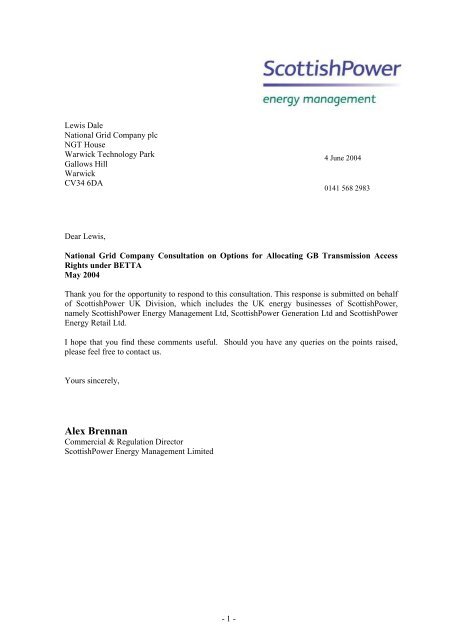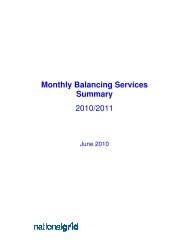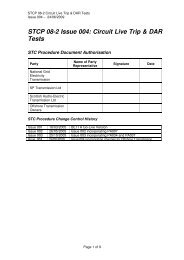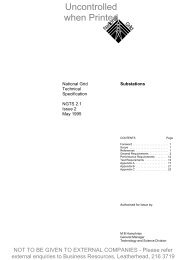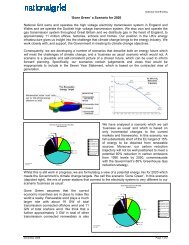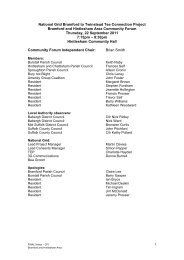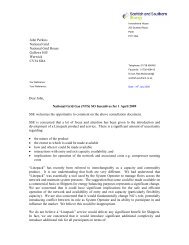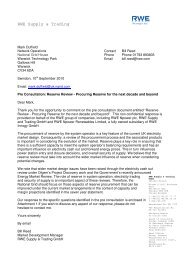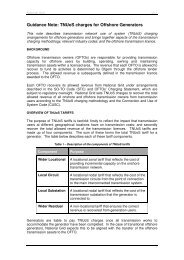Alex Brennan - National Grid
Alex Brennan - National Grid
Alex Brennan - National Grid
You also want an ePaper? Increase the reach of your titles
YUMPU automatically turns print PDFs into web optimized ePapers that Google loves.
Lewis Dale<br />
<strong>National</strong> <strong>Grid</strong> Company plc<br />
NGT House<br />
Warwick Technology Park<br />
Gallows Hill<br />
Warwick<br />
CV34 6DA<br />
Dear Lewis,<br />
- 1 -<br />
4 June 2004<br />
0141 568 2983<br />
<strong>National</strong> <strong>Grid</strong> Company Consultation on Options for Allocating GB Transmission Access<br />
Rights under BETTA<br />
May 2004<br />
Thank you for the opportunity to respond to this consultation. This response is submitted on behalf<br />
of ScottishPower UK Division, which includes the UK energy businesses of ScottishPower,<br />
namely ScottishPower Energy Management Ltd, ScottishPower Generation Ltd and ScottishPower<br />
Energy Retail Ltd.<br />
I hope that you find these comments useful. Should you have any queries on the points raised,<br />
please feel free to contact us.<br />
Yours sincerely,<br />
<strong>Alex</strong> <strong>Brennan</strong><br />
Commercial & Regulation Director<br />
ScottishPower Energy Management Limited
<strong>National</strong> <strong>Grid</strong> Company Consultation on Options for Allocating GB Transmission Access<br />
Rights under BETTA<br />
Response by ScottishPower UK Division<br />
1 Executive Summary<br />
ScottishPower UK Division (SP) has made clear to <strong>National</strong> <strong>Grid</strong>, Ofgem and the Government the<br />
urgent need to remove the current uncertainties in relation to grid access faced by SP and other<br />
investors and potential investors in generation plant in Scotland in the run up to BETTA until<br />
enduring arrangements can be put in place. We welcome this consultation paper setting out a<br />
number of options as an important step in the process to remove the uncertainty and urge <strong>National</strong><br />
<strong>Grid</strong> and Ofgem to work together to complete the process as soon as possible.<br />
SP supports Option IV as the means of removing the uncertainty with parties who have been<br />
offered immediate or future access to networks in GB prior to the BETTA access transition date,<br />
being allocated firm GB access rights. The uncertainty for parties in Scotland who had applied<br />
for access but had not been connected was introduced on 26 January 2004 when Ofgem/DTI<br />
published the statement on access to the GB transmission system, and we therefore believe that this<br />
is the appropriate BETTA access transition date.<br />
We support a transitional category up to the BETTA access start date with parties offered firm<br />
access if reinforcements are not necessary and offered less firm access if reinforcements are<br />
necessary. It is important to recognise that less firm rights should only be necessary when there is<br />
a system constraint affecting the particular connection and that if the plant being connected can<br />
operate unconstrained then it should not be required to wait for other system reinforcements to be<br />
completed before access is made firm. We believe that the BETTA access start date should be<br />
the same as BETTA Go-live, currently planned as 1 April 2005.<br />
We support the enduring process category with parties being offered firm rights contingent on the<br />
availability of sufficient physical network capacity such that the Transmission Licensees will<br />
continue to meet the requirements of their transmission security standards. It is important that<br />
sufficient transmission capacity is available to facilitate full access to the GB-wide electricity<br />
market and in particular that the reinforcements identified under the RETS programme are put in<br />
place as soon as possible to ensure the Government can meet its renewables targets. It is important<br />
that in the period from BETTA Go-live until the RETS programme is completed that access can be<br />
granted to new renewable generators in Scotland and therefore it will be necessary to continue with<br />
some aspects of the transitional arrangements during this period with less firm rights being granted<br />
to some parties.<br />
It is necessary to recognise the link between transmission access and transmission charges and to<br />
ensure that the granting of less firm access rights does not result in more extreme locational<br />
charges for existing and new generators. We believe that any locational differentials should be<br />
calculated on the basis of firm rights only and should not be affected by the granting of additional<br />
non-firm access rights. <strong>National</strong> <strong>Grid</strong>’s proposals for GB access protect the rights of existing<br />
connected generators and similar protection of rights of existing connected generators should also<br />
apply to charges for connection to and use of the network.<br />
- 2 -
2 Response to Specific Views sought by <strong>National</strong> <strong>Grid</strong><br />
a) The various approaches identified for providing users with existing access to the<br />
Scottish and England & Wales networks with a transition to the access to the GB<br />
transmission system. In particular, identifying the most appropriate option and why.<br />
ScottishPower UK Division (SP) believes that Option IV is the most appropriate means of<br />
removing the uncertainty introduced by Ofgem/DTI for SP’s current and potential<br />
investments in renewable generation in Scotland. This will restore firm access to projects<br />
which have been offered network access but are not yet connected to the system, including<br />
in particular any windfarm projects on which construction has already commenced. This<br />
will also apply to windfarms which, although connection will be to the distribution system,<br />
have received offers on the basis that access to the transmission system will also be<br />
required.<br />
An important feature of Option IV is the transitional category where parties will be offered<br />
firm access if no reinforcements are necessary and will also be offered less firm access if<br />
reinforcements are necessary. We believe that it will be necessary to extend these<br />
transitional arrangements from BETTA Go-live until the full reinforcements are in place<br />
which will ensure full access to the GB-wide electricity market for the generation mix<br />
required to meet the Government’s environmental targets.<br />
b) If an auction were to be conducted, views on the most appropriate design of auction.<br />
We do not believe that any form of auction would be an appropriate means of removing or<br />
reducing the current uncertainty in relation to network access. We believe auctions would<br />
in fact increase the uncertainty and would be a disincentive to current and potential<br />
investors in renewable generation in Scotland and as such would work against achievement<br />
of the Government’s environmental targets.<br />
c) If firm GB access rights were to be provided to all users with existing agreements to<br />
use the Scottish and England & Wales network and those users accepting agreements<br />
prior to a BETTA access start date, the appropriate date at which access rights can<br />
be distinguished and subsequent applications for access should be processed by the<br />
GBSO in accordance with the proposed enduring BETTA access arrangements.<br />
We believe that the most appropriate BETTA access start date is BETTA Go-live,<br />
currently planned as 1 April 2005.<br />
Our concern with Option II, however, is that firm access may be given to a particular<br />
generator where it is clear that reinforcement of the network would be necessary. This<br />
would discriminate against generators who can be connected to the system without the<br />
need of reinforcement. The transitional arrangements in Option IV pragmatically<br />
recognise that offering less firm access would ensure maximum use of the physical<br />
network without discriminating against network users.<br />
d) If firm GB access rights were to be provided only to users with existing agreements to<br />
use the Scottish and England & Wales network offered before a suitable BETTA<br />
access transition date, the appropriate choice of such a date.<br />
We believe that the most appropriate BETTA access transition date is 26 January 2004<br />
since this was the date of the first indication given by Ofgem/DTI that there could be a<br />
shortage of GB access rights from BETTA Go-live. Prior to the publication of this<br />
- 3 -
statement Ofgem/DTI had given no indication that existing access rights/agreements would<br />
not necessarily be migrated directly over to the BETTA arrangements. In Ofgem’s<br />
December 2001 consultation paper on BETTA it stated, Page 88, ‘As part of their role in<br />
the SO workstream the three transmission licensees undertook a piece of work to model<br />
the impact of constraints on the Scotland-England interconnector. In the process of this<br />
work the parties concluded that at a capacity of 2,200MW, following the completion of the<br />
North Yorkshire line, constraint volumes and thus constraint costs would be non-material.’<br />
e) If users within a transitional category were to be offered the choice of non-firm/lessfirm<br />
access arrangements, the appropriate approach for determining such<br />
arrangements and setting transmission charges.<br />
It is important to recognise that less firm rights should only be necessary when there is a<br />
system constraint affecting the particular connection and that if the plant being connected<br />
can operate unconstrained then it should not be required to wait for other system<br />
reinforcements to be completed before access is made firm.<br />
The most appropriate option for non-firm/less-firm access rights will vary depending on<br />
the particular user and network requirements and could include any of the options set out<br />
in the paper.<br />
It is not clear how the introduction of non-firm access rights would impact on the<br />
calculation of TNUoS tariffs. NGC’s currently proposed GB TNUoS methodology<br />
calculates TNUoS tariffs on the presumption of all users being granted firm access rights<br />
to a network built to accommodate their requirements according to the relevant security<br />
standards, and being eligible for compensation payments at times when this access is not<br />
delivered. It is therefore inappropriate to treat users with non-firm access in the same way<br />
as those with firm access in the calculation of those tariffs, as well as in their application.<br />
We do not support the proposals outlined in paragraph 65 of the consultation, namely that<br />
users with non-firm access should pay TNUoS charges on that access and receive preagreed<br />
refunds as appropriate. This implies that non-firm access capacity is treated in the<br />
same way as firm access capacity within the DCLF and tariff model used in that<br />
methodology. This would overstate the locational signals on users with firm access, and<br />
take no account of the reduced network infrastructure required to provide non-firm access<br />
compared to firm access. The uncertainty associated with non-firm access means that a<br />
special, lower charge should be derived for application to non-firm access.<br />
Specifically, we believe that if NGC’s currently proposed GB TNUoS methodology is<br />
adopted for BETTA then users with non-firm access should be excluded from the DCLF<br />
model used to calculate the TNUoS tariffs, i.e. the network model should only include<br />
users with firm access. In this way the locational differentials would be calculated on the<br />
basis of firm rights only, and would not be affected by the granting of additional non-firm<br />
access rights.<br />
Further, while we do not support the use of a locational security charge in general, we<br />
believe that it is particularly inappropriate that any user with non-firm access rights should<br />
be required to pay a locational security charge, given that the network infrastructure<br />
capacity necessary to grant them firm access to the relevant security standards has not been<br />
built.<br />
- 4 -
In addition, respondents may wish to provide views on the proposed enduring regime for<br />
allocating access to the GB transmission system and any alternative approaches to the<br />
allocation of transmission access capacity for BETTA.<br />
We support the enduring process category with parties being offered firm rights contingent on the<br />
availability of sufficient physical network capacity such that the Transmission Licensees will<br />
continue to meet the requirements of their transmission security standards. It is important that<br />
sufficient transmission capacity is available to facilitate full access to the GB-wide electricity<br />
market and in particular that the reinforcements identified under the RETS programme are put in<br />
place as soon as possible to ensure the Government can meet its renewables targets. It is important<br />
that in the period from BETTA Go-live until the RETS programme is completed that access can be<br />
granted to new renewable generators in Scotland and therefore it will be necessary to continue with<br />
some aspects of the transitional arrangements during this period with less firm rights being granted<br />
to some parties.<br />
- 5 -


